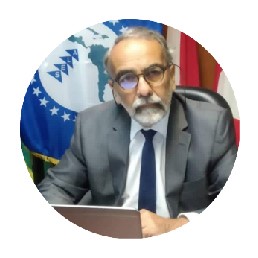introduction
Corruption is a social, political and economic phenomenon that affects all countries of the world, a reality from which the Latin American and Caribbean (LAC) region does not escape. Its serious consequences affect the productive structure and the social and economic development of countries, as well as the stability of democratic institutions and the rule of law.
In many LAC countries, corruption is seen as an inevitable consequence of the exercise of power. Causes of this endemic evil are varied, but institutional weakness, opacity in the management of resources by the public sector, and the apathy of the population to defend its interests stand out.
In recent years, corruption has reached alarming levels and various forms of manifesting itself. Its modalities penetrate the public and private sectors in the form of bribery practices, fraud, illicit enrichment, influence peddling, diversion of resources, nepotism, even the use of privileged information for personal purposes, among others. In the case of the public sector, it manifests itself mainly in the areas of public procurement; public infrastructure; state-owned enterprises; customs administration; and public services, according to the World Bank (WB).[1]
The impacts of corruption are universally known, but when it involves State sectors, such as public procurement and infrastructure, its implications are more serious for low-income countries because of their impact on gross domestic product (GDP). Contracts without tenders, the absence of competitors, excessive cost overruns of time and money, little or no maintenance, unfinished monumental works, and the low quality of completed works end up adversely affecting economic growth, poverty alleviation, and private investment, in particular investment by multinational companies increasingly subject to international competition.
The preferential treatment by the State also generates serious consequences. The management of funds for direct and indirect subsidies, debt repayments and tax exemptions and compensations are abused to meet non-commercial objectives, which can be diverted for personal or political benefit. Such is the case of bankrupt state-owned enterprises that often enjoy easy access to non-profit loans by state-owned banks to mitigate the damage caused.
Corruption in customs is no different. A country's ability to benefit from the global economy is affected by delay in processing imports and exports. It also acts as a disincentive for foreign investors by increasing the costs of doing business and reducing the competitiveness of companies.
No less important are the effects of corruption on the provision of services that should be guaranteed by the State. Public management and the administrative functioning of the State are eroded when the normal course of administrative procedures for obtaining a public service is altered due to a bribe.
The complexity of this scourge demands integrated responses. The international community has made efforts in this regard by first adopting the Inter-American Convention against Corruption (1996), the first international legal instrument in this field that recognizes the international importance of corruption and the need to promote and facilitate cooperation among States. Subsequently, the United Nations Convention against Corruption (2003), a legally binding international anti-corruption instrument, was adopted. However, the edges of corruption are so diverse that these tools have not been sufficient to achieve a lasting solution. More than stepping up international cooperation is needed to successfully implement the main areas of such an instrument, namely prevention of corruption, penalty and law enforcement, international cooperation and asset recovery.
Beyond identifying the best practices of some countries that contribute to the design of global strategies and the institutional strengthening of the capacity to respond to this problem by improving the role and effectiveness of anti-corruption agencies, tax and audit administrations and justice systems, governments are obliged to implement public policies that attack the root of the problem and its devastating effects on the productive structure and on the society.
Governments face many challenges in addressing corruption, such as identifying what instruments usually work and why. It is not only a matter of having solid institutions and creating legal frameworks aimed at prosecuting and penalizing those who misuse public resources, but also of achieving greater public transparency, better government management, citizen participation and social inclusion.
Of equal importance is to provide governments with technological tools that enable them to promote reforms that lay the foundations for government management in a spirit of transparency, integrity, inclusion and collaboration. The global digitization of governments and citizens must be deepened to change the face of public sector governance and its effects on the fight against corruption.
Access to information and better collaboration between the State and society are key tools for achieving this purpose. The lack of information on the budget and the administrative management of public resources prevents social control of activities and results of governments, thus facilitating the conditions for corruption.
In this context, the economic and social development of Latin America and the Caribbean requires strategies that promote citizen participation and their active collaboration in the formulation of specific public policies that meet their needs. The progress made in these areas will depend on the tools adopted.
Strengthening the institutional capacity and the rule of law in the region are fundamental elements in the fight against impunity for acts of corruption. Promoting the adoption of technology and innovation for monitoring public resources, as well as increasing the resource mobilization of international financial institutions can make a difference in this regard.
The use of information and communication technologies are also monitoring tools that strengthen the notion of transparency and accountability by promoting administrative simplification, which reduces opportunities for corruption by avoiding contact with public officials with discretionary behaviour in administrative processes.
In conclusion, the social and economic consequences of corruption adversely affect the development of countries. On the one hand, they generate losses in productive growth as a result of the misuse of public resources or the concentration of these funds in corrupt hands. On the other hand, they produce social inequality, insofar as sectors of the population linked to the highest political spheres with access to the administration of State resources are favoured.
Among the impacts of corruption on the various structures of the countries, the following stand out:
- Undermining investment and worsening poverty.
- Distortion of incentives for local or foreign private investment, which reduces economic efficiency and consequently long-term production.
- Over-investment by government in capital projects due to the ease of capturing revenue from public procurement and reducing the return on investment.
- Deterioration of the business environment in the private sector. It is preferred to invest in activities with rapid and excessive profits in a short time rather than purely productive ones.
- Lack of vision and innovation in the business sector. The production of companies does not depend on their competitiveness but on their ability to influence decision-makers regarding the regulation or destination of their productive activity.
- Development of monopolistic or oligopolistic structures in the markets, where usually the same group of companies is favoured in the allocation of contracts.
- Capital flight to the extent that profits from corrupt activities are deposited abroad or are associated with relaxed anti-money laundering procedures.
- Provision of poor infrastructure, which increases the risks of accidents and costs of wear, as well as the payment of additional taxes on citizens.
- Curbing innovation and creative development by unprotecting intellectual property. Companies paying bribes to maintain their competitiveness, with either tariff reduction or exemption or subsidized credits, stop investing in patents or operating permits.
- Social and political distortions. Societies can face a loss of values by seeing this type of activity as natural. They can also seriously affect their political systems by penetrating them in the search for accomplices.
- Diversion of resources. Part of public expenditure is earmarked either for the fight against corruption or for the exploitation of corrupt activities, rather than activities for more socially productive purposes such as education and health.
- Significant decrease in government revenue collection. The World Bank estimates that 30% to 50% of total tax revenues in developing countries are affected by corrupt practices.
- Impact on customs administrations in terms of trade facilitation and border protection, including the compromising of security requirements for the trafficking of illicit goods, including weapons and narcotics.
- High cost to society. The taxpayer who agrees to pay bribes pays for inefficiency in the provision of services, and several times for the same service.
- Harm to the consumer. When corruption becomes necessary to acquire a productive input or avoid minimum quality controls, markets receive goods and services in insufficient quantities of lower quality or more expensive.
[1] (http://documents.worldbank.org/curated/en/986521600118147288/Executive-Summary)
Central theme
To analyze the impact of corruption on the productive structure and the economic and social development of the countries of Latin America and the Caribbean, as well as the review of possible solutions based on information technologies.
Objectives
|
Information on the event
Aimed at: Parties interested in the issue of corruption and its impact on the social and economic development of the Latin American and Caribbean region
Format: Online conference with a duration of approximately 100 minutes, to be held via Zoom.
Registration form: https://bit.ly/2TLMypm
Date and time: Wednesday, 1 September 2021, 11:00am Caracas time (UTC -4:00).
Co-organizer: CLAD
Languages: Languages: Spanish (Main) and English (Simultaneous Interpretation).
Agenda
|
1 September 2021 11:00 am Caracas time |
|
| 11:00 - 11:10 |
Opening and welcome remarks Moderator: Ambassador Oscar Hernández, Director of Relations for Integration and Cooperation of the Latin American and Caribbean Economic System (SELA).
|
| 11:10-12:10 |
Introduction of the Panellists Theme: To analyze the impact of corruption on the productive structure and the economic and social development of the countries in Latin America and the Caribbean, as well as the possible solutions based on information technologies.
|
| 12:10-12:30 |
Questions and answers from participants Participants' questions will be collected through the chat of the Zoom and YouTube platforms and read to panellists, so that they can formulate their answers. |
| 12:30 - 12:40 |
Conclusions and closing session Moderator: Ambassador Oscar Hernández, Director of Relations for Integration and Cooperation of the Latin American and Caribbean Economic System (SELA). The moderator will present the conclusions of the seminar and thus close the event. |
Moderator

Ambassador Oscar Hernández, Director of Relations for Integration and Cooperation of the Latin American and Caribbean Economic System (SELA)
A Career Ambassador in the Venezuelan Foreign Service. He has stood out as an international trade negotiator, with his performance as an alternate representative to the World Trade Organization standing out. There, he served as a Panellist in International Trade Disputes within the framework of the Dispute Settlement Body; Chair of the Committee on Trade-Related Investment Measures (2000); Chair of the Committee for the creation of the Legal Advisory Centre, and Rapporteur for the Trade Policy Review of Romania (2000). He also chaired the First Expert Meeting on Electronic Commerce and Laws at UNCTAD (1999).
He served as National Coordinator of the Group of Three (G-3) and Executive Director of the Commodities Committee (The Hague-Netherlands); Chairman of the WTO Committee on Trade-Related Investment Measures (2000); Member of the Committee for the creation of the WTO Legal Advisory Centre. Rapporteur of the Trade Policy Review of Romania (2000) and the Investment Policy Review of Peru (UNCTAD-2001).
He obtained a Bachelor’s Degree in Political Studies, majoring in International Relations, from the Central University of Venezuela (1974-79) and a Master’s Degree in International Relations from the University of California (1982-84).
Panelists

Raimundo Soto is an Associate Professor at the Pontificia Universidad Católica de Chile. He received his Ph.D. in Economics from the Georgetown University. Academically, he focuses on macroeconomics, applied industrial organization and economic development issues, particularly in the areas of conflict and democracy. His research is mainly aimed at the development of quantitative models for the study of economic growth, fiscal and monetary policies, and exchange rate regimes. He has published several books and articles in prestigious international journals such as American Economic Review, Review of Economic Dynamics and World Development, among others. Professionally, he has participated as an expert in numerous litigations related to anti-competitive practices, abuses of market power, and collusion. Before joining the Catholic University, he worked at the World Bank, the Central Bank of Chile and the Alberto Hurtado University. He has been a consultant to various international organizations (IMF, IDB, World Bank, African Development Bank, OECD, among others). From 2010 to 2012, he was Director of International Development at the Dubai Economic Council of the United Arab Emirates. From 2008 to 2010, he was President of the Sociedad de Economía de Chile. In 2020, he was Co-Director of the Economics Board that advised the Covid-19 Social Board. He is the Managing Editor of the Middle East Development Journal.

Roberto de Michele is a senior specialist at the Inter-American Development Bank and director of the IDB's transparency and integrity cluster. In his capacity, he is Secretary of the Transparency Fund, which supports reforms of public integrity, open government, spending transparency, strengthening of agencies for control and prevention of money laundering. Mr. de Michele was director of the Anticorruption Office of Argentina, Manager of the Private Initiative against Corruption at the Poder Ciudadano Foundation and founding member of the Association for Civil Rights (ADC). Mr. de Michele chaired the Preparatory Meeting for the Drafting of the United Nations Convention against Corruption and participated in the drafting of the Follow-up Mechanism of the Inter-American Convention against Corruption. Among other publications, he is the author of the book “Codes of Ethics in Companies” and “Use of information for the integrity of the financial sector: Reflections on the basis of a project against money laundering in Guatemala”, and is one of the co-authors of the Anticorruption Toolkit for the United Nations Global Pact against Corruption. He obtained a Bachelor’s Degree in Law from the University of Buenos Aires and a Master's Degree in Law from the University of Yale.

Manuel Villoria is a Professor of Political Sciences at the Rey Juan Carlos University of Madrid (URJC), where he directs the Observatory on Good Governance. He is Director of the Master’s Degree in Senior Public Management of the Ortega y Gasset University Institute (IUOG)-UIMP and of the Master’s Degree in Security, Crisis and Emergency Management IUOG-URJC; he holds a PhD in Political Science and Sociology from the Complutense University of Madrid; he also has a Bachelor’s Degree in Law and a Bachelor’s Degree in Philology. He was a Fulbright Scholar in the USA, where he obtained a Master’s Degree in Public Affairs from the Indiana University. He is the author of more than two hundred publications (books and articles) on public administration and administrative ethics. He has held various positions in the Spanish public administration, such as that of Technical Secretary General of Education and Culture in the Community of Madrid. After the closure of this agency, he has been a member of the Governing Council of the State Agency for Evaluation of Policies and Quality of Services (AEVAL). He is also a member of the Scientific Council of CLAD. He is also founder and member of the Board of Directors of Transparency International, Spanish chapter. He has been Guest Professor in various Spanish and foreign universities, consultant for the OECD, the IDB and the European Union. He has participated in different commissions on public administration reform in Spain and Latin America. He is now President of the Ethics Commission of the Spanish Olympic Committee and of the Royal Spanish Football Federation.

Alejandro M. Estévez
- Postdoctoral studies (completed) in Public Administration from the FCE-UBA, Argentina.
- Ph.D. in Administration and Public Policy from the Ecole Nationale d'Administration Publique, Université du Québec, Canada.
- Master’s Degree in Public Administration from the Faculty of Economic Sciences, UBA.
- Bachelor’s Degree in Political Science from the Faculty of Social Sciences of the UBA.
- Diploma in project evaluation from the UNAM and the OAS, Mexico.
- He was Undersecretary (Institutional Director) of the National Institute of Public Administration (INAP).
- He was Chief Researcher of the AFIP Institute (Federal Administration of Public Revenues, Argentina).
- He is a professor and senior researcher at various public universities (UBA and UNLZ) and private universities (UTDT) in undergraduate, graduate and doctoral degrees in matters of Administration and Public Policy.
- He is a Guest Professor at the IEP (Institute d'études Politiques) at the Université Pierre Mendes-France, Grenoble, France, and at the MBA at the National University of Asunción in Paraguay.
- He has been a consultant to multilateral organizations in various programmes related to public policies and their evaluation (IDB and WB).
- He has participated in the design and management of two civic dialogues, with funding from UNDP.
- He is a member of the doctoral and postdoctoral committee on Public Administration of the FCE UBA.
- He is the director of the Master's Degree in Applied Administration from the FCE, National University of Lomas de Zamora.
- He is also the director of the Centre of Studies on the State and Public Organizations (CEDEOP) of the FCE UBA.
- He is deputy director of the Institute for the Modernization of the State, National University of Lomas de Zamora.
- He has written several books and articles in his field of expertise.
Support documents
http://www.oas.org/en/sla/dil/docs/inter_american_treaties_B-58_against_Corruption.pdf
https://www.unodc.org/ropan/en/AntiCorruptionARAC/united-nations-convention-against-corruption.html
Contacts
Latin American and Caribbean Economic System - SELA:
Sayed Durán, Analyst of the Direction of Relations for Cooperation and Integration, Permanent Secretariat.
Latin American Centre for Development Administration (CLAD):
Nelson De Freitas, School of the Latin American Centre for Development Administration (CLAD).